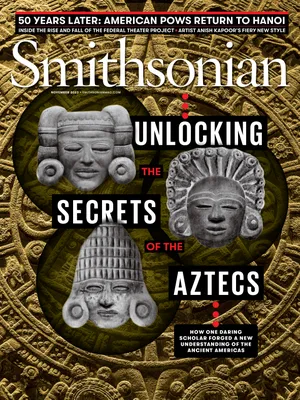Was Ancient Egypt’s Most Lasting Influence in the Field of Fashion?
An exhibition in Cleveland showcases millennia-old designs and the more modern creations they inspired
:focal(1173x800:1174x801)/https://tf-cmsv2-smithsonianmag-media.s3.amazonaws.com/filer_public/1a/6b/1a6b5574-b328-4c61-b3b7-327cf816adb6/kaliris1.jpg)
In 1924, Paris jeweler Cartier debuted a makeup vanity case inspired by the door of an ancient Egyptian tomb. Adorned with mother of pearl, coral and lapis lazuli, the case’s design hearkened back to the discovery of Tutankhamun’s tomb two years prior, when archaeologist Howard Carter peered through an unsealed door in the Valley of the Kings and discovered “wonderful” ancient artifacts, as he reported back to his companions, according to one popular account.
Carter’s unprecedented find ignited the West’s interest in a civilization that dominated the world for some 3,000 years, ushering in a movement that touched every realm of Western culture, from architecture to film to the decorative arts. Now, an intimate exhibition at the Cleveland Museum of Art argues that Egyptomania’s most lasting influence was in the field of fashion, where Egyptian-inspired styles became a byword “of sophistication and elegance,” says curator Darnell-Jamal Lisby.
The show—“Egyptomania: Fashion’s Conflicted Obsession”—features examples of ancient designs and the more modern creations they inspired. A purse, created by the London-based Egyptian design house Sabry Marouf and inspired by the gold headdress of King Tut’s funerary mask, mirrors and inverts the royal regalia’s silhouette while recalling a traditional striped head cloth known as a nemes. A 13th-century B.C. tomb relief believed to depict the wife of Amenhotep, a physician who served under Ramses II, wearing a kalasiris, or long linen dress, is mirrored by a white jersey gown designed by Karl Lagerfeld for Chanel in 2019.
As Lisby notes, the relief shows that “ancient Egyptian dress became the most complex during the New Kingdom period” between the 16th and 11th centuries B.C., incorporating ornamentation like beaded gowns and sheer capelets. Contemplating the spectrum of contemporary clothing inspired by ancient Egypt is “like [looking into] a kaleidoscope,” Lisby says, as every designer interprets the civilization differently, whether the results are “uber glamorous, uber abstract or a little bit of both.”
/https://tf-cmsv2-smithsonianmag-media.s3.amazonaws.com/accounts/headshot/mellon.png)

/https://tf-cmsv2-smithsonianmag-media.s3.amazonaws.com/accounts/headshot/mellon.png)